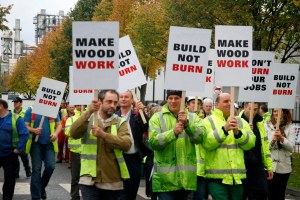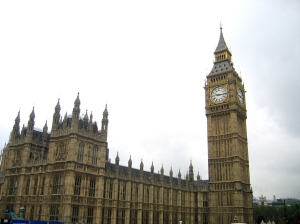‘It’s barking up the wrong tree’, says Wood Panel Industries Federation

An industry group whose business and commerce relies on UK wood says the Government is barking up the wrong tree with its proposed renewable energy plans, especially those concerned with the use of biomass, as part of the commitment to carbon emission reduction targets.
New legislation will bind the UK into an agreement to meet a carbon emissions cut of 80% of 1990 output by 2050 (60% by 2030). The agreement relies on increased use of, and investment in, renewable electricity and/or heat from wind, wave and tidal sources as well as biomass.
Alastair Kerr, Director General of the Wood Panel Industries Federation (WPIF) which is spearheading a ‘Make Wood Work’ campaign, warns that the plans could cause the exact opposite of the Government’s vision – a drastic increase in carbon emissions, the diversion of UK wood supply into inefficient electricity generation, larger household bills for consumers, and the potential death in the UK of industries that currently contribute positively to the UK both financially and environmentally.
Chris Huhne, Secretary of State for Energy and Climate Change has already stated that renewables will be absolutely crucial to securing energy supplies and reducing carbon emissions in the decades ahead, and that the Government are reforming the electricity market to help bring forward a surge of investment in renewables1.
 Kerr says, “Until the mass capacity required of wind, wave and tidal energy is reached, and additional biomass capacity from short-rotation and energy crops occurs, one of the most widely available supplies of renewable energy will come from subsidised and notoriously inefficient electricity-only biomass plants burning UK wood.
Kerr says, “Until the mass capacity required of wind, wave and tidal energy is reached, and additional biomass capacity from short-rotation and energy crops occurs, one of the most widely available supplies of renewable energy will come from subsidised and notoriously inefficient electricity-only biomass plants burning UK wood.
“This is being actively encouraged through the Renewables Obligation (RO) scheme and the energy suppliers have been quick to respond. Currently, there are an estimated 16 UK biomass fired electricity power stations in operation, under construction or awaiting approval3. Their demand, coupled with RO subsidies, will distort the UK wood market and it threatens our industries’ future viability.”
The UK has current capacity to produce between 10-11 million tonnes of harvested green wood (wood that has recently been cut from a living tree) per year, and around 4-4.5 million tonnes of waste wood arisings.
Currently demand for small forest roundwood and recycled wood by existing users is broadly in balance, but there are supply strains starting to appear and any significant increase in demand by the subsidised electricity sector will seriously distort the market.
A report2 produced by John Clegg Consulting for the Wood Panel Industries Federation and CONFOR estimated that the demand for biomass from wood, wood chips and pellets, and wood waste by 2017 would be 50 million green tonnes. One proposed plant, RWE npower’s Tilbury B coal-fired power stations is requesting planning permission to adapt to burn wood – this alone would require 6+ million tonnes a year.
 Kerr continues, “The consequence of redirecting, through subsidy, the wood we use today into energy generation would result in a net increase in CO2 emissions totalling six million tonnes per annum – which is bad news for the environment and the taxpayer. It will drive industries and jobs abroad and once the UK wood and wood waste supply dries up, wood will have to be imported, leading to increased costs passed to consumers, and additional carbon emissions through transportation.”
Kerr continues, “The consequence of redirecting, through subsidy, the wood we use today into energy generation would result in a net increase in CO2 emissions totalling six million tonnes per annum – which is bad news for the environment and the taxpayer. It will drive industries and jobs abroad and once the UK wood and wood waste supply dries up, wood will have to be imported, leading to increased costs passed to consumers, and additional carbon emissions through transportation.”
“The message is simple”, says Kerr. “There is not enough wood available in the UK to support the number and scale of biomass electricity plants that are being proposed for development. The RO subsidies promote the burning of wood rather than locking up the carbon through use, re-use, recycling and only then burning it for energy. This goes against the grain of our own industry practice and the Government’s previously stated support for the waste hierarchy.
“If left unchecked, the subsidy regime could displace existing wood processors and those who rely on UK wood for product manufacture. It is putting at unnecessary risk many thousands of jobs, hitting the pockets of already stretched consumers through increased energy bills and the knock-on effect that increased wood prices will have on the products we produce.
“Most shockingly, the reality behind the climate change deal and the Renewables Obligation policy is that unless rewards to those burning wood for electricity are stopped immediately, in one fell swoop it will actually increase carbon emissions over the next 20 or so years – the exact opposite of the stated goal.”
- Chris Hukne responds to Renewable Energy Review
- Department of Energy and Climate Change
- “Wood fibre availability and demand in Britain 2007-2025”









